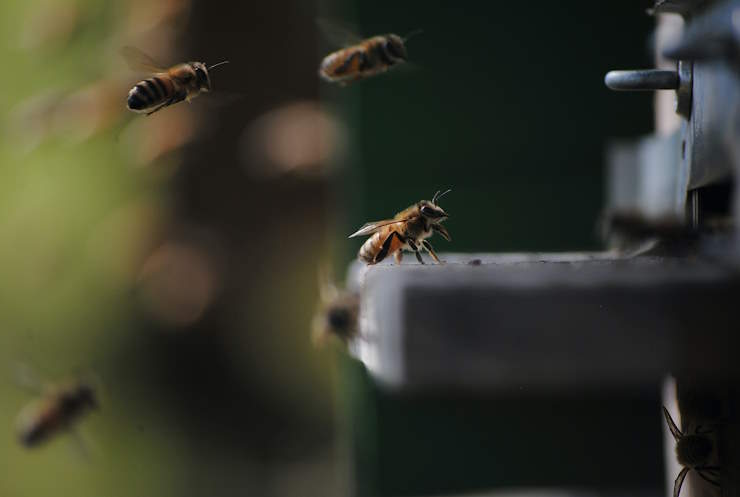Bees! The little critters that our life here on Earth depends on. They’re hard-working, queen-worshiping, sugar-loving social beings, just like ourselves. Even more so, they are, according to science, addicted to caffeine. Wait, what?

What is actually going on, where do bees get a cup of coffee, are they addicted to it, and what’s caffeine after all? Let’s find out.
Bees love caffeine
Turns out, bees love caffeine. We know from our observations that bees (and not only honeybees) are more attracted to nectar feeders that have increased caffeine content. But what does it actually mean? Why do scientists study such a bizarre association, and why is it even a thing?
To get to that, let’s first recap what caffeine is. We might think that plants have made this substance for our enjoyment, but caffeine in fact is an insecticide – a toxin used to deter and poison insects that might want to munch on the leaves of the plants, such as cocoa, coffee, and tea.
It is merely by coincidence that it is also similar to a molecule that signals tiredness to our brain, thus making our body not realize that we are tired, by outcompeting that molecule. You can read more about how caffeine works here.
But if it is made to deter insects, why do bees like it? Does it help them when they don’t get enough sleep? And how do they get it, after all, I have not heard of bees munching on coffee or tea leaves.
Caffeine: a poison that became a drug
Funnily enough, while some plants synthesize caffeine in their leaves, some others, such as lemon, grapefruit, and orange plants, have devised a way to inject some caffeine into their nectar. A reminder, nectar is a substance that plants want bees and other insects to consume.
Oh, c’mon! If caffeine is supposed to deter and even kill insects, why is it in nectar, a substance that has quite the opposite function, to attract them?
Possibly, for the same reason we use it to drug ourselves: in lower concentrations, several poisons can serve as stimulants.
The nectar of the coffee, tea and citrus plants contain only one to six percent of that found in coffee leaves, approximately. This is somewhat comparable to the caffeine content found in a cup of coffee. Now it starts to make sense.

Plants actively drug bees, to get more pollination. And it has also been demonstrated by science. One example, bees were given color-coded feeders with food of different caffeine concentrations. Apparently, bees visited feeders that had higher concentrations and when tested with artificial pollen, it turned out that these feeders (aka artificial flowers) received more bee visits, and more pollination.
That suggests that plants evolved lightly caffeinated nectar, to attract pollinators. Sort of like putting them on a needle, so they come back again and also seek more flowers of similar color and shape. Isn’t nature wonderful — plants are drugging bees!
So are bees caffeine junkies? Not necessarily!
But does it really mean that bees are getting addicted? It certainly appears so, but let’s be careful. One other study showed that caffeine excites cells in bees’ brains (yes, bees have brains) that are responsible for memory. The authors of the study also demonstrated that indeed it helped bees to learn to associate specific scents with a sugary reward faster when they were fed caffeine in concentrations similar to that of nectar.
This is a suggestion that bees tend to learn the location of the best nectar in the town faster when they receive caffeine. I don’t know about you, but that sounds like a good thing to me. The authors of the particular study also ask to use the term “addiction” with care, since addiction is usually reserved for detrimental things.
In the case of bees and the caffeine in pollen, no study has ever demonstrated that this caffeine-seeking in bees might be harmful to them. For example, alcohol has been shown to cause addiction in bees, since it makes them forget everything else in the world, and makes them sick.
Caffeine, on the other hand, makes bees seek more nectar, which is beneficial. Even more so, a newer study has shown that caffeine also helps to fight bacteria — more good news. Of course, again, it’s caffeine in low concentration, just as in nectar or a cup of coffee.
So, it’s a win-win-win situation: memory boost, fending off pathogens, and ensuring more pollination for flowers. We can hardly call bees caffeine addicts and junkies.